Your baby’s brain: How parents can support healthy development
Your baby’s brain is built over time: It starts during pregnancy, and continues through to early adulthood. And like a building, it needs a strong foundation.
The brain is made up of several different areas that control everything we do—from hearing and walking to problem-solving and how we feel. Each area has millions of brain cells, or neurons. These neurons communicate with each other by passing chemical messages over tiny spaces called synapses. As the messages are repeated over and over, more links are made and “neural pathways” are formed. Think of these pathways as the brain’s “wiring.” In the first years of life, these connections develop at an extremely fast pace.
So how does this development happen? That’s where parents come in. You can help your baby’s brain develop in healthy ways. It doesn’t take special toys or equipment, and it’s easier than you might think! Read more on the Caring for Kids website.
Your child’s development: What to expect
Children develop skills in several different areas:
- Gross motor: These are movements using the body’s large muscles and include sitting, standing, walking, running, keeping balance, and changing positions.
- Fine motor: These skills use the small muscles in the hands and fingers. Fine motor skills include using hands to eat, draw, dress, play, and write. They develop over time and also involve hand-eye coordination.
- Language: Speaking, using body language and gestures, and understanding what others say.
- Social: Connecting and having relationships with others, cooperating, and responding to others’ feelings.
- Cognitive: These are thinking skills—learning, understanding, problem-solving, reasoning, and remembering.
For a milestone chart, check out Caring for Kids website.
Positive discipline for young children
The goal of discipline is to guide and teach, not to punish. The foundation of discipline is a warm and trusting relationship, where you help children learn to:
- behave appropriately for their age in different situations,
- recognize, express and manage their emotions,
- communicate,
- get along with and trust others,
- solve problems,
- explore the world and learn appropriately.
Discipline should be fair and consistent. If you respond differently in similar situations or to similar behaviours, children will be confused. They won’t know what to expect. Check the Caring for Kids website for more.
More on Discipline
Region of Peel agrees that being a parent is challenging but it’s also very rewarding. Your child learns by watching you. You teach your child everyday about many things, such as, family values, how to get along with others, understanding their feelings, rules and how to stay safe. As hard as you try to teach them, sometimes kids will just misbehave.
Creating a Bond
You’ll be spending time with and caring for your baby right from the moment he’s born. This time you spend together will help you build a relationship that will last throughout your lives. Region of Peel provides some more useful information including how to bond if (due to medical reasons) you cannot physically be with your child.
How do I know my baby is developing a secure attachment?
According to Caring for Kids, the early signs that a secure attachment is forming are some of a parent’s greatest rewards:
- By 4 weeks, your baby will respond to your smile, perhaps with a facial expression or a movement.
- By 3 months, they will smile back at you.
- By 4 to 6 months, they will turn to you and expect you to respond when upset.
- By 7 or 8 months, they will have a special response just for you (they may also be upset by strangers). Your baby may also start to respond to your stress, anger or sadness.
Just for Dads
Your involvement is important during pregnancy, birth and throughout the life of your child. This is an exciting time, but you may be apprehensive and have questions about pregnancy, looking after a baby and about your new role as a dad.
Check out 24HR Cribside Assistance, a manual just for new dads, developed by dads for dads! Like a car manual, sections include:
- Performance
- Fuel consumption
- Safe operation
- Do-it-yourself
- Under the hood
- Dad’s tool kit
- Fine tuning and fun
- Troubleshooting
- Aboriginal Dads
Connect with Dads across Canada at Dad Central Canada.
Separation Anxiety
If a family member is going to be away for a long period of time, Parent Positive shares some things that you can do to help prepare your child for the absence.
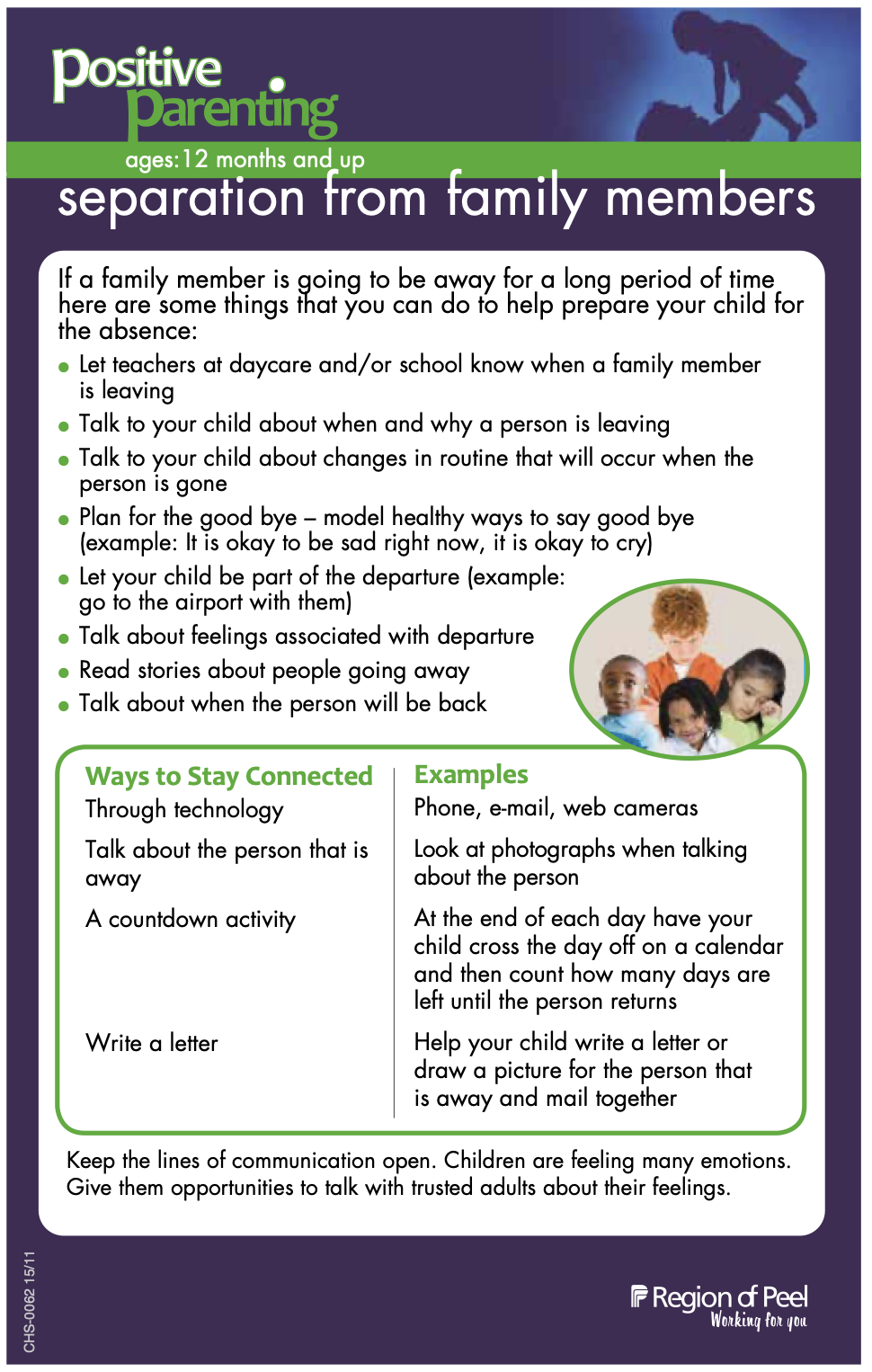
Self-Regulation
Every child responds to incoming sensory stimulation and various challenges in his or her own way, and learns to manage these responses on an individual timetable. Being attuned to individual differences in children’s development of self-regulation – in the way each child manages sensory stimulation and responds to challenges – enables educators to establish the kind of nurturing relationships that strengthen children’s capacity for learning. Government of Ontario has more on this topic.
Parenting Styles
There are three different parenting styles – democratic, authoritarian and permissive. The style that works best for parents and kids is the democratic parenting style. Read more on this from Region of Peel.
Development by Age Group
Toddler (15 Months – 2.5 Years)
How can I help my toddler learn and grow?
It looks like your child is playing, but it’s much more than that. As your toddler plays, she’s working hard and learning new skills. Her brain is developing quickly, laying the foundation for lifelong learning, behaviour and health. Visit Ministry of Ontario; Children, Community and Social Services for tips and advice on various topics such as sleeping, comforting, setting limits, eating and much more.
Setting Limits
Another Positive Parenting Worksheet discussing limits:
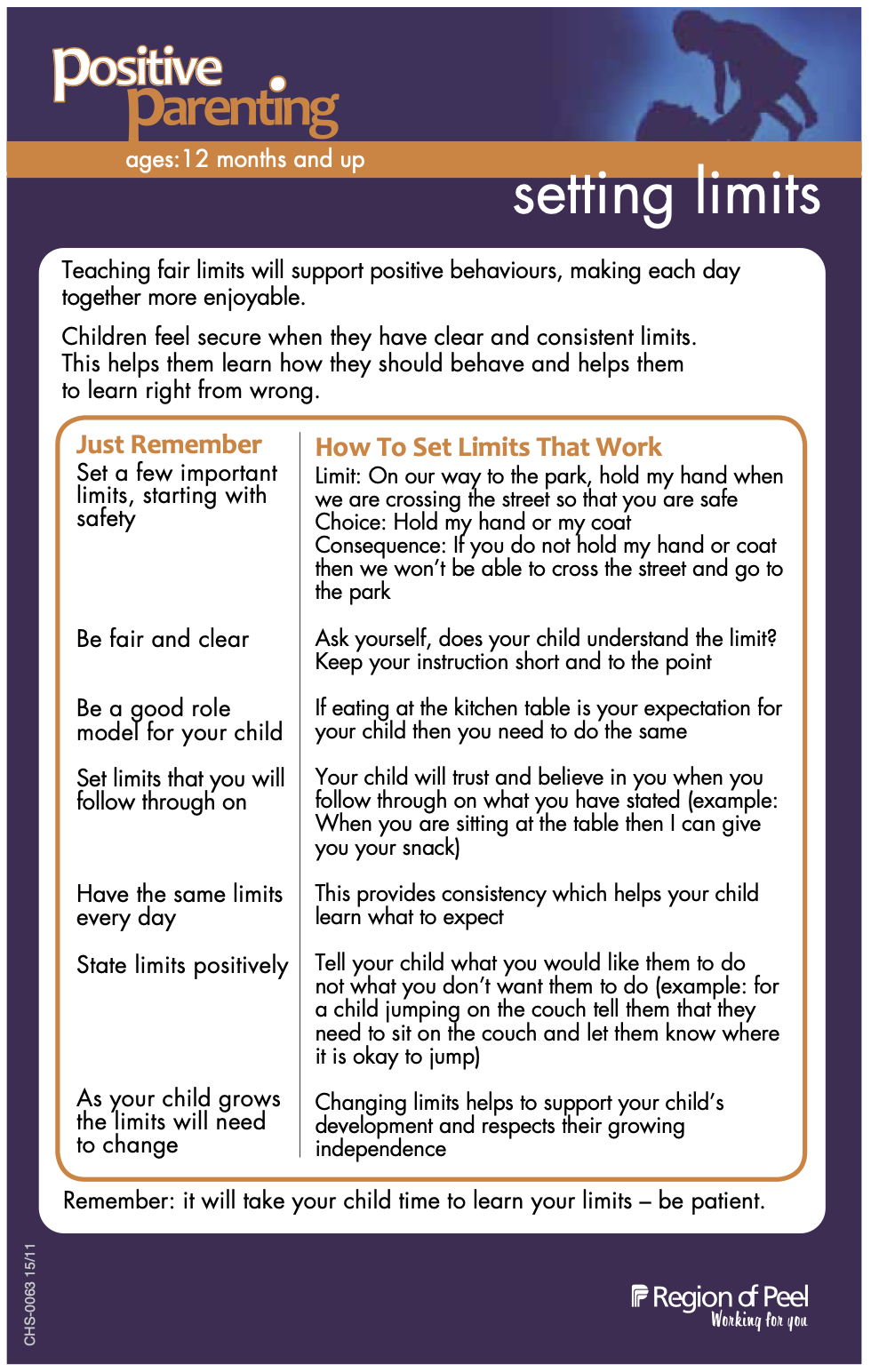
Teaching fair limits will support positive behaviours, making each day together more enjoyable
Making Choices
Positive Parenting Worksheet discussing choices:
Being able to make choices gives children some control over their day and helps them to feel good about themselves. When making choices children learn: how to think for themselves, how to make good decisions and it helps to decrease power struggles.
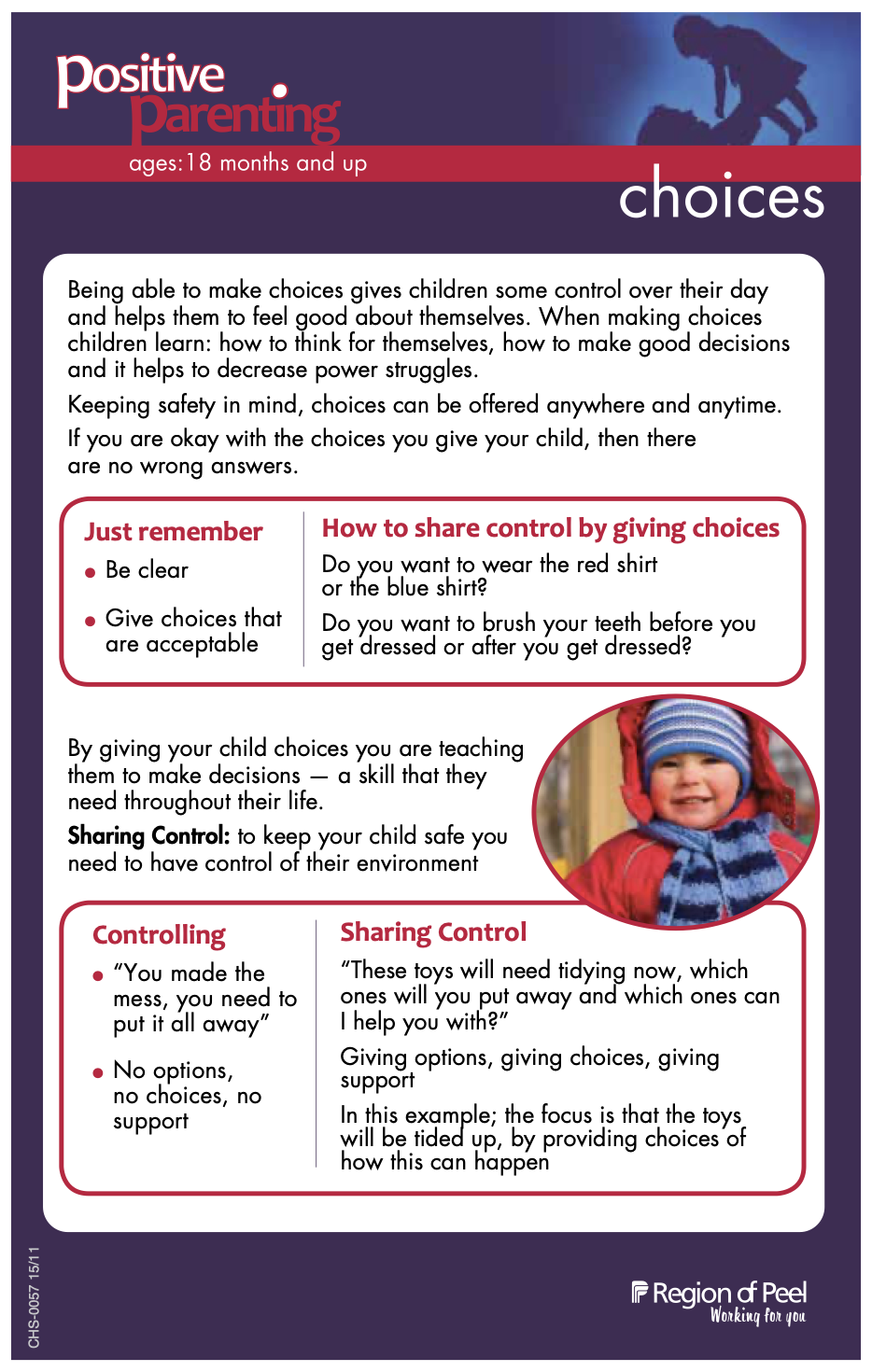
Vocabulary and Expressions
This is a time when a toddler’s vocabulary and expressions increase significantly. Parents can help this learning process. Toddlers like it when you:
- Let them touch and hold books while you point to and name the pictures.
- Use real words instead of baby talk — “give me” instead of ta ta or “bottle” instead of baba.
- Take the time to listen to them. They want you to hear all of their new sounds, words and ideas.
- Give them simple directions to follow — “Go find your red boots”.
- Use lots of different words when you talk to them:
- opposite words like up and down, in and out
- action words like “running”, “splashing” descriptive words like “happy”, “big”, “little”, “clean”, “dirty”
- Encourage them to play with other children — at the library, play groups, playground and park.
Source: Government of Canada
Preschool Speech and Language
The first years of life are very important for learning speech and language. From the time they are born, children start communicating. Very early in their lives, they learn to understand what you are saying and to make sounds of their own. They are beginning to develop speech and language skills. Communication skills are critical to your child’s future success. Find a wealth of information on the Ministry of Ontario; Children, Community and Social Services website.
Preschool Speech and Language Program Infant Hearing Program via Ministry of Ontario – Playing with your child and including language in the play will support your child’s language development: English and French versions.
Toilet Training
Peel Region helps with how to start the transition from diapers/pull-ups.
Temper tantrums and emotions
Children have feelings just like adults do, but the difference is that they need your help learning what those feelings are and how to deal with them. They also learn by watching you, so try your best to react to situations in a positive way. Region of Peel breaks everything about emotions and everything about tantrums.
Parent Positive sums it up:
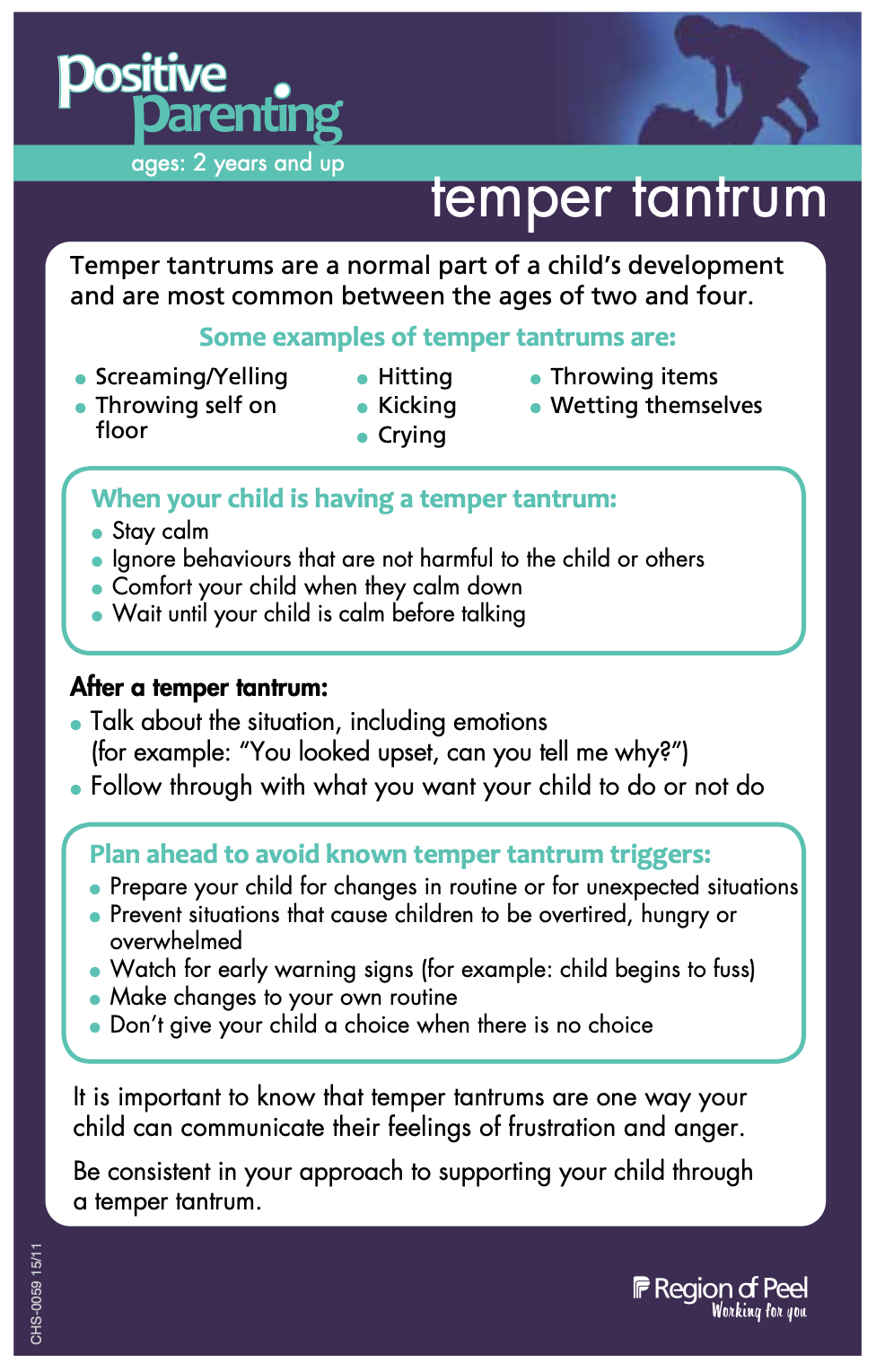
Praise and Encouragment
Kids need their parents’ encouragement and support – and not just when they do a good job. Encouraging them will help them want to learn new skills; it will also show them that you love and respect them no matter what. Read more from the Region of Peel on how to build their self-esteem with praise and encouragement.
Jealousy and Sibling Rivalry
Jealousy between brothers and sisters is normal. It is called sibling rivalry. Jealousy can start when there is a new baby in the family. It may last until children are in their teens. Find out how to tell if your child is jealous what to do in these situations via Region of Peel.
Preschool (2.5 Years – 4 Years)
Your child’s development: What to expect
Between the ages of 2½ and 3½, preschoolers are learning new things faster than ever. Their language is blossoming. They are now using words to explain what they want and how they feel. Preschoolers’ imagination is rich at this age. As their play becomes more creative, parents may hear them talking about imaginary friends and places. Joining your preschooler in her play helps you build a positive relationship with your child. Visit Ministry of Ontario; Children, Community and Social Services for tips and advice on various topics such as getting ready for school, what to expect at this age, discipline, vaccines and much more.
Consequences
A consequence is the result or outcome of something, and is one way children learn about their behaviour. A parent’s role is to teach their child how their actions impact others/self. Parent Positive has a great summary:
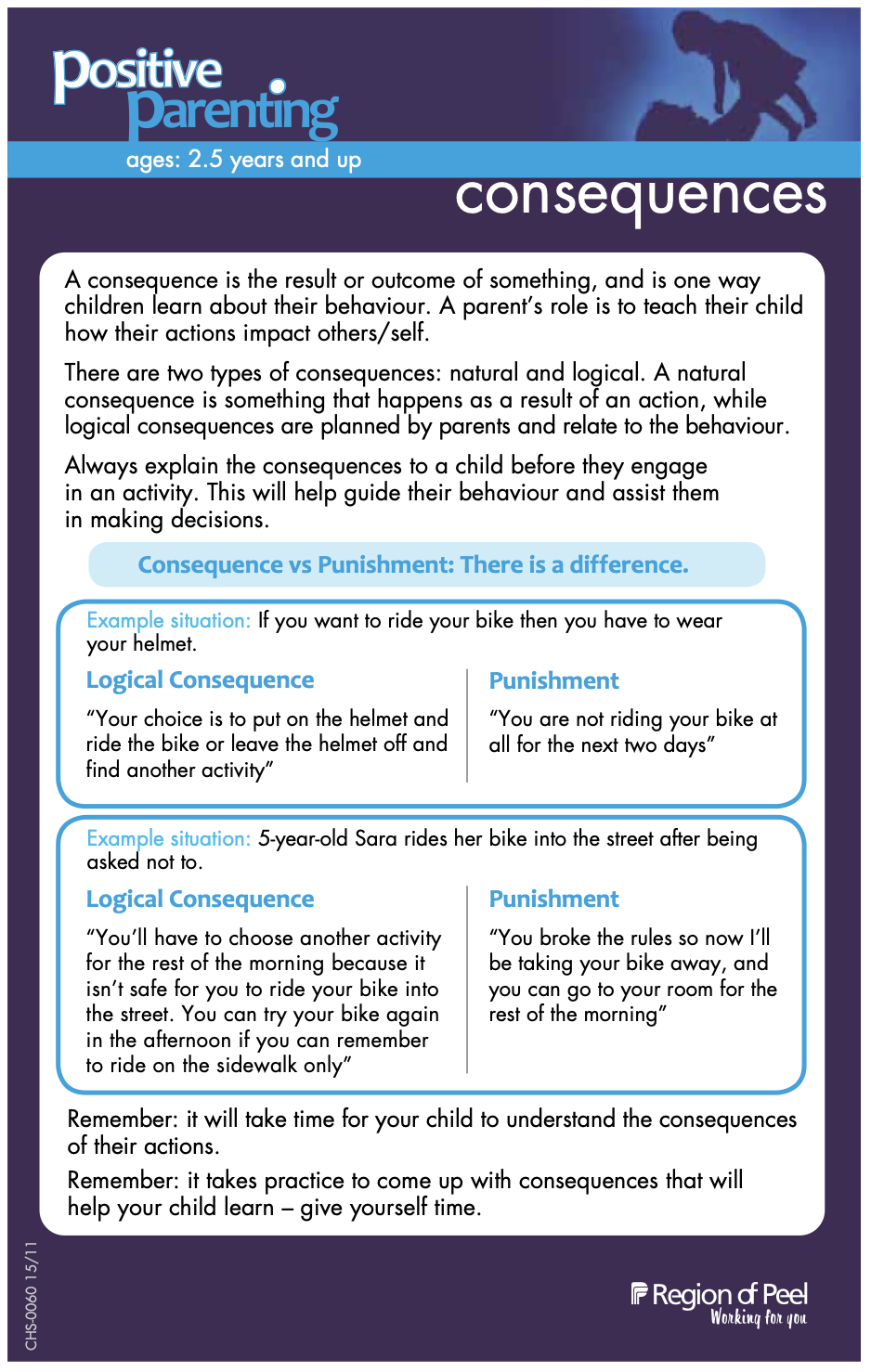
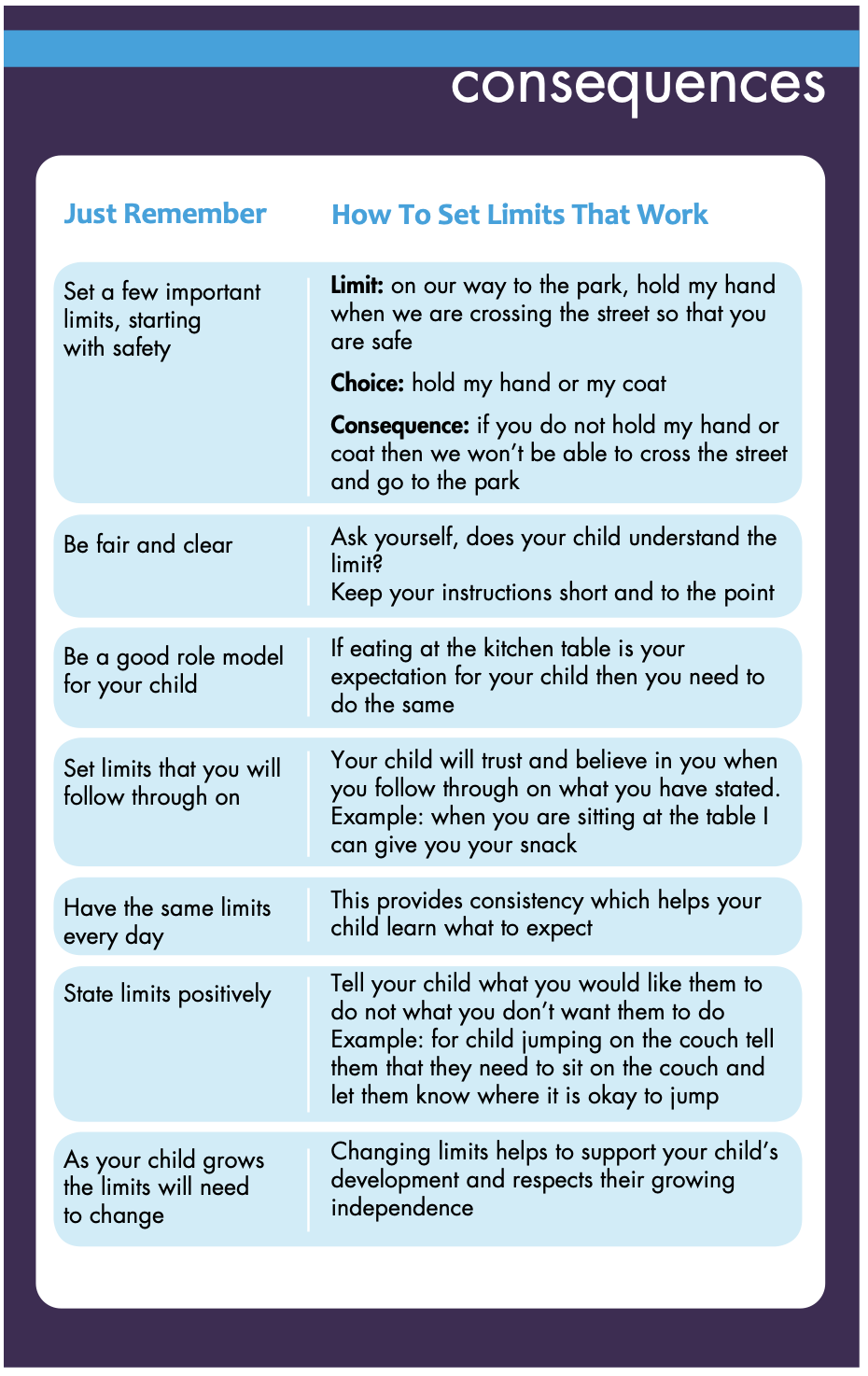
Bullying
Learn to recognize what bullying looks like, what to do and more on bullying from Region of Peel. Bullying is:
- Is being mean to others, on purpose, to hurt them or their feelings
- Is about power and control
- Occurs every seven minutes on elementary school playgrounds
- Most often happens while others watch
- Doesn’t stop when children are left to deal with it themselves
Bullying Quiz for Parents and Children
We can all help stop it
Via Government of Ontario; learn what to watch for, what you can do and where you can go to get help if your child is being bullied. Parents and guardians of students in elementary and secondary school can use this guide to get information.
Learn how to stop preschooler from bullying or help them deal with a bully via PREVnet.
Cognitive Development
A child’s brain develops significantly very early in their lives, and then another burst of development occurs in middle childhood, between the ages of five and nine. This launches a period of time when a child’s brain is primed for learning — they have greater adaptability or “plasticity,” and are open to change. Find out more on brain development from Ministry of Ontario.
Brain Development And Processing
Check out these easy to read charts stating “What’s Happening?”, “How can I tell?” and “How Can I Help?”
I have a child entering school — 3½ to 6 years. How can I help my child learn and grow?
Starting school, making new friends and adjusting to new rules is a big change for your child. She needs your encouragement and support. You can help her learn how to get along with others and how to cope in new situations. Read more from Region of Peel here.
School Age (4 – 12 Years)
Middle Years
Children are at a critical developmental stage between ages six and 12. The experiences children have in these crucial years set a foundation for the habits, perceptions and attitudes they will have for a lifetime.
Ontario’s Middle Years Strategy supports children and their families at this critical age. The strategy helps families, policy makers, service providers, educators, and community organizations better understand and respond to the challenges and opportunities that face this group of young people.
A Strategic Framework to Help Ontario Middle Years Children Thrive
Gearing Up lays the groundwork for an integrated and coordinated approach to the planning and delivery of services and programs for young people in Ontario ages 6–12 and their families.
Screen time and young children
Children under 5 years old are exposed to more screens than ever before, including televisions, computers, gaming consoles, smartphones and tablets. What is the right amount to let them watch? How do I choose what they watch? Caring for Kids answers these and many other common questions regarding screen time.
